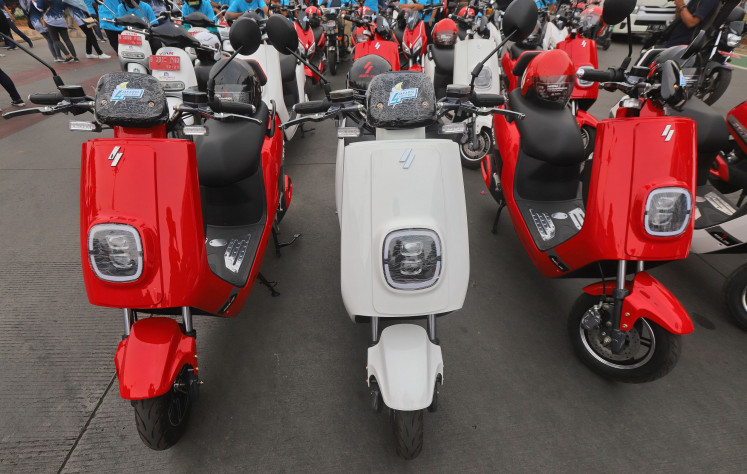Regulated agents still irk business players
Nearly two years after its implementation, the regulated agent (RA) policy remains a source of concern among business players as they claim it contributes to persistently high logistics costs
Change text size
Gift Premium Articles
to Anyone

N
early two years after its implementation, the regulated agent (RA) policy remains a source of concern among business players as they claim it contributes to persistently high logistics costs.
RA are cargo agents or freight forwarders certified by the Transportation Ministry to perform cargo security checks at airports. Logistics companies are required to use services of these RAs to screen their cargoes in unrestricted areas before moving to secure areas.
Since its inception, this has stirred controversy, with business groups complaining over the high cost of services and tight requirements to become RAs.
Indonesian National Air Carriers Association (INACA) secretary general Tengku Burhanuddin said the obligation to use RAs had pushed up logistics costs for air freight.
“I think RAs should not exist. Maybe then the [freight] costs would go down,” he recently said.
Tengku said that based on the Aviation Law, airlines were essentially in charge of their own air cargoes. Therefore, if they had the financial means to do what RAs currently carried out, they would be able to perform the tasks themselves and that would lower their logistics costs.
“The warehouse costs should also be addressed. [...] they are very high,” he said, referring to a suggestion to improve the requirements to become RAs.
The cargo director of national flag carrier Garuda Indonesia, Sigit Muhartono, voiced a similar view, saying that logistics costs could be slashed if airlines could handle obligatory security checks on their own.
“An airline remains the party with the most vested interest in ensuring that each cargo that goes in [the aircraft] complies with safety and security. But, we know that our capability to check [the cargo] is still limited,” he said.
Prior to the rule requiring the use of RAs, the security inspections were conducted by state-owned airport operator Angkasa Pura.
Claiming that these inspections were insufficient to guarantee compliance with the International Civil Aviation Organization’s (ICAO) safety standards, the Transportation Ministry demanded the use of RAs to scrutinize cargoes in airports such by X-ray scanners and explosive detectors.
The ministry has actually revised the previous rule on RAs issued in 2015 in response to the concerns of business players. The new regulation, Transportation Ministerial Decree No. 53/2017, allows service pricing based on market mechanisms, replacing the designated fee set earlier in the former regulation.
It also scrapped the requirement to have Rp 25 billion in working capital for entities to be certified as RAs and instead, demanded the possession of a minimum 500 square meters of land, among other stipulations.
The International Air Transport Association (IATA) has also previously criticized the regulation on RAs, saying it could reduce the competitiveness of Indonesia’s air freight.
Indonesia has seen its logistics costs skyrocket over the past two years, eroding the competitiveness of domestic business players against global rivals.
Indonesia slid to 53rd place in the 2016 World Bank Logistics Performance Index, down by 10 places from 2014.
Responding to the mounting concerns by business players, the Transportation Ministry’s director for aviation safety, Muhammad Nasir Usman, said that airlines could have just taken over the role of RAs as they were also in charge of the cargo safety and security, but doubted their financial capacity to do so.
“The security checks require X-ray scanners, human resources and land. It was impossible [for them] to prepare all those things in each location. They might have gone bust,” he said.
The government did not want the RAs to become reckless with unregulated fees as that would affect the quality of the services, Nasir said.
It was preparing standards on cargo services to prevent such a thing happening, he added.









